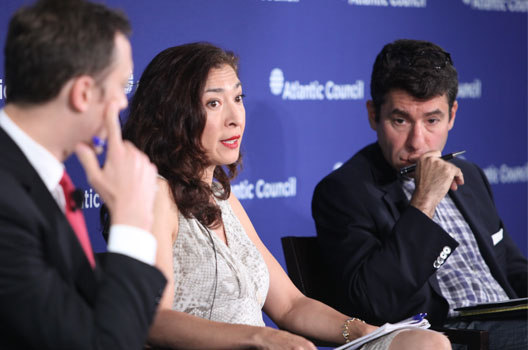 In the wake of an attempt by factions of the Turkish military to oust Turkish President Recep Tayyip Erdoğan from power on the night of July 15, foreign policy experts point to increasing instability and a tightening authoritarian grip as core barriers to the resumption of Turkey’s European Union accession negotiations.
In the wake of an attempt by factions of the Turkish military to oust Turkish President Recep Tayyip Erdoğan from power on the night of July 15, foreign policy experts point to increasing instability and a tightening authoritarian grip as core barriers to the resumption of Turkey’s European Union accession negotiations.
“There will be no EU accession. Whatever the Europeans want to do with regard to post-coup…Europe is subject to the implicit Turkish threat to send large numbers of refugees to Europe. The Turks have Brussels over a barrel on that issue especially given the way that politics are playing themselves out within European capitals,” said Steven Cook, a senior fellow at the Council on Foreign Relations.
“Europe will be outraged by what is happening in Turkey, but will remain relatively mute because they fear that Erdoğan will let the refugees come across the [European] border,” he added.
Cook spoke at the Atlantic Council in Washington on July 26—ten days after the failed coup. He was joined by Elmira Bayrasli, a visiting fellow with the New America Foundation. Aaron Stein, a senior fellow with the Atlantic Council’s Rafik Hariri Center for the Middle East, moderated the discussion.
In the wake of the failed coup, the Turkish government has rounded up, interrogated, imprisoned, and restricted the movement of an estimated 58,000 political, academic, civil service, and military personnel. The swiftness of the crackdown led some Western officials to conclude that the crackdown was premeditated. “It looks at least as if something has been prepared. The lists are available, which indicates it was prepared and to be used at a certain stage,” Johannes Hahn, the EU commissioner dealing with Turkey’s EU accession negotiations, said on July 18.
Turkey’s EU accession talks were rekindled following the implementation of a controversial migrant deal negotiated between EU member states and Turkey. Under the terms of the deal, all migrants who attempt to enter Europe via the Aegean Sea will be sent back to Turkey. In a “one-to-one” swap, Europe will take in one Syrian from a Turkish refugee camp for every Syrian returned from Greece. That number, however, has been capped at 72,000. Turkey already hosts close to three million Syrian refugees. At the time, the deal’s implementation brought the question of visa-free travel for Turkish citizens in the Schengen area and financial integration issues to the negotiation table.
Turkey has undergone unprecedented economic growth but Erdoğan’s ruling AKP (Justice and Development Party) has tightened its authoritative grip over the past decade.
“[Turkey’s economic growth] has not been matched by the growth of politics in society. You have social mobility and movement, but Turkey’s political system has not advanced…You have a very weak opposition, a very weak state institution, and a very weak rule of law,” said Bayrasli.
“When you have this imbalance where you have great economic prosperity and social mobility but you are not matching it with the political and social advancement, it’s a cocktail for chaos,” she added.
Turkey has been a key supporter of US and European combat operations against the Islamic State of Iraq and al-Sham (ISIS) in Syria. Turkey is a NATO ally. US and other NATO allies have launched combat operations against ISIS out of Turkey’s Incirlik air base.
On the night of the attempted coup, power to Incirlik was cut off and the base was surrounded by pro-AKP military personnel who detained coup conspirators in the military. Incirlik has since returned to full operational capability and the security threat to the base has been downgraded.
Despite Incirlik’s speedy recovery, Cook pointed to the overarching effects following the coup attempt that could potentially endanger long-term relations between Turkey and its NATO partners.
“If we see the capturing and dismissing of thousands of officers and tens of thousands of people with a country focused in on itself, a military that is in chaos, a police force and ministry of interior that has been decimated by purges, one has to wonder whether Turkey can be an effective partner for the United States,” said Cook.
“We should think about Turkey as an unstable country. They have a war with the PKK, they have experienced at least eleven terrorist attacks—six of which can be traced to the Islamic State, they have a military in chaos and a purge underway that is undermining the effectiveness and capacity of the Turkish state,” he added.
Ostensibly, the ripple effects from the failed coup will be felt in Europe, the United States, and in Turkey itself as it continues to deal with domestic and regional security challenges.
“The mechanisms of the state are in for some tough times. Things will start to completely slow down,” said Stein.
“Not only do you have the purges going on, but for those that remain, there is a chilling effect in place about how do you operate within a system that is under a lot of pressure and where everyone is under suspicion depending on whether you were or were not involved with the coup attempt,” he added.
Mitch Hulse is an editorial assistant at the Atlantic Council. You can follow him on Twitter @mitchhulse.
Image: From left: Aaron Stein, a senior fellow with the Atlantic Council’s Rafik Hariri Center for the Middle East, moderated a discussion at the Atlantic Council on July 26 with Elmira Bayrasli, a visiting fellow with the New America Foundation, and Steven Cook, a senior fellow at the Council on Foreign Relations, on the implications of the failed coup attempt in Turkey on July 15. (Atlantic Council/Victoria Langton)
